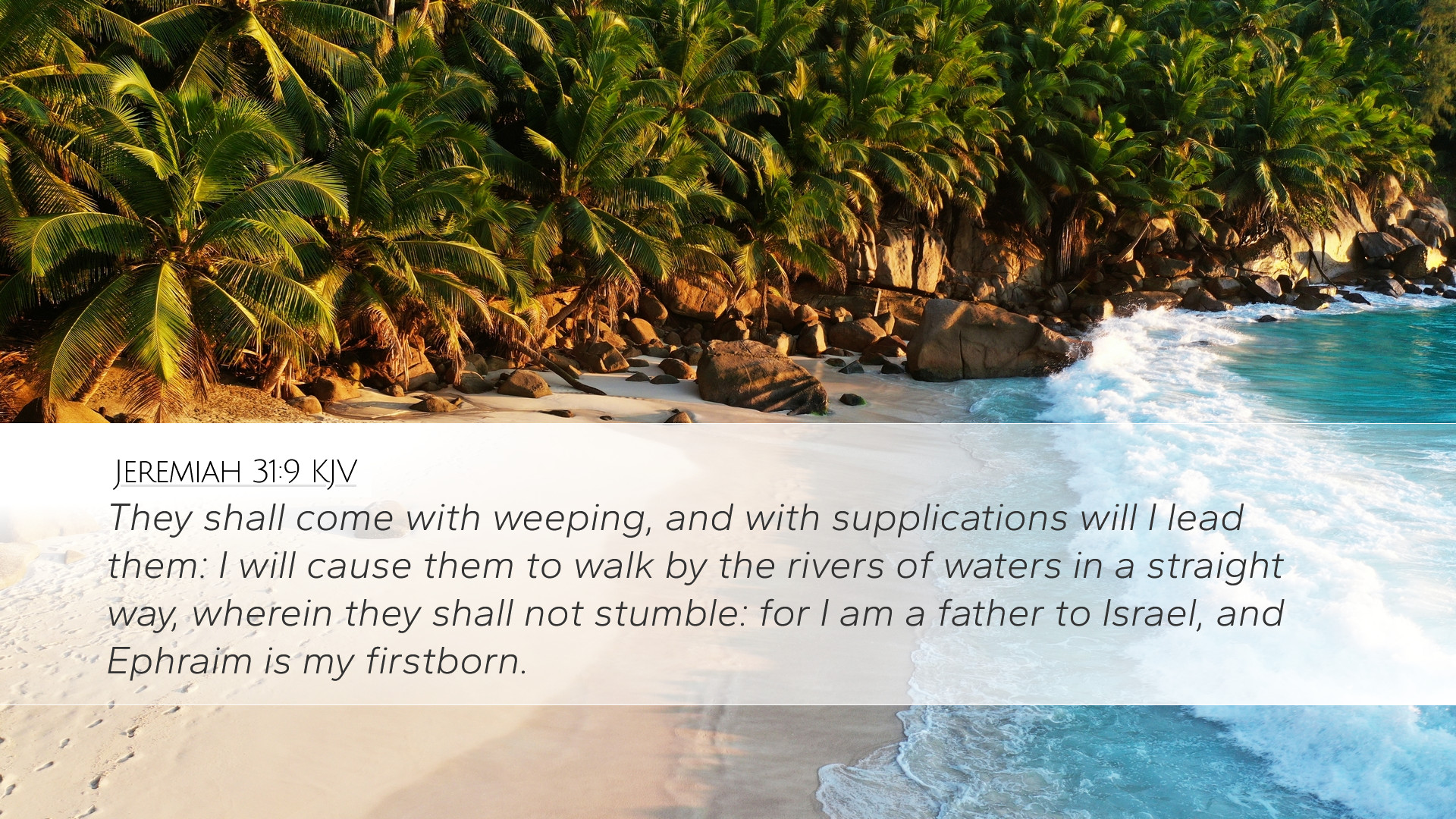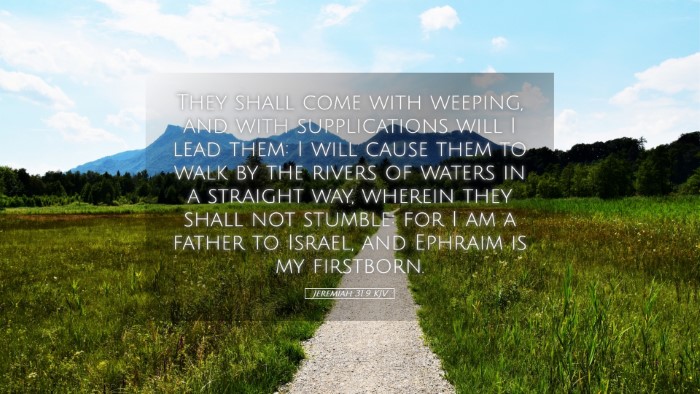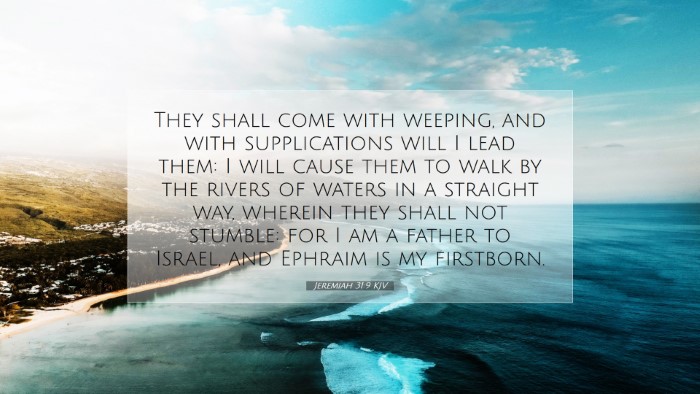Commentary on Jeremiah 31:9
Verse: "They shall come with weeping, and with supplications will I lead them: I will cause them to walk by the rivers of waters in a straight way, wherein they shall not stumble: for I am a father to Israel, and Ephraim is my firstborn."
Introduction
The Book of Jeremiah, attributed to the prophet Jeremiah, is often marked by themes of judgment and restoration. In chapter 31, we find a powerful expression of hope and promise of return. This particular verse encapsulates the emotional journey of the exiled Israelites as they are invited back to their homeland. Commentaries by revered theologians such as Matthew Henry, Albert Barnes, and Adam Clarke provide profound insights into the implications of this text.
Contextual Analysis
Jeremiah 31 falls within a section of the book that promises restoration to Israel following devastation. The verse reflects God's commitment to redeem His people and to guide them back. Each phrase in this verse reveals layers of theological significance, pointing towards the character of God and His relationship with Israel.
The Theme of Weeping and Supplication
Matthew Henry highlights that the weeping is indicative of genuine repentance and sorrow for sin. Such lamentation is a necessary precursor to restoration, for it reflects a heartfelt acknowledgment of Israel's disobedience. Weeping signifies an emotional return to God, which is essential for reconciliation.
Adam Clarke adds that the term "supplications" illustrates the earnestness of their prayers as they recognize their need for divine intervention. This emphasis on prayer reveals God's readiness to respond to His people's pleas and reflects the relational aspect of their restoration.
The Guidance of God
The phrase "I will lead them" suggests a fatherly guidance. Albert Barnes explains that this is a promise of divine direction. Just as a father would lead his children, God assures Israel that He will guide them gently and with care, demonstrating His compassionate nature.
Furthermore, Matthew Henry points out that God's guidance is not arbitrary but leads to "the rivers of waters," indicating abundance and life. This path symbolizes a return to a place of spiritual nourishment, reflecting God's intention to restore not just physically but spiritually as well.
The Straight Way
The reference to a "straight way" emphasizes a path that is clear and just. Albert Barnes interprets this as God leading His people away from the pitfalls and dangers that caused previous stumbling. It assures the faithful that upon returning, they will see a direct and righteous path, devoid of confusion and misdirection.
Adam Clarke further adds that this "straight way" symbolizes a return to the covenantal faith practices that define their identity as God's people. It upholds the promise that their future endeavors will be blessed and protected under God’s guidance.
Theological Implications
At its core, Jeremiah 31:9 offers several theological insights that are fundamental for a comprehensive understanding of God's character and His covenant with Israel.
The Fatherhood of God
The assertion, "for I am a father to Israel," underlines the intimate relationship between God and His people. Albert Barnes notes that this divine fatherhood indicates God’s persistent love and commitment to His children despite their failures. The term "Ephraim is my firstborn" signifies favored status and carries the weight of inheritance and responsibility within the family.
Matthew Henry elaborates on the analogy of fatherhood by emphasizing how God's nurturing love reflects His care and guidance through the trials of life. It invites believers to approach God not only as sovereign but as a loving Father who desires their connection and well-being.
Promises of Restoration
This verse, steeped in the context of exile and return, underscores God's promise of restoration. Adam Clarke notes that this promise is multifaceted, encompassing physical, spiritual, and communal restoration for Israel. It signifies hope that despite their failures, God's grace is boundless and redemptive.
Albert Barnes remarks that the emotional aspects of returning, reflected in weeping, signify a preparation for deeper communion with God—an acknowledgement that true restoration demands humility and repentance. It sets the tone for genuine revival and renewal in their relationship with God.
Applications for Today's Believers
The insights gleaned from Jeremiah 31:9 offer rich implications for contemporary believers, pastors, and theologians alike.
Call to Repentance
Understanding that weeping and supplication precede restoration calls the faithful to recognize the gravity of sin. Matthew Henry conveys that genuine remorse leads to healing, encouraging believers today to approach their transgressions with humility and a desire for reconciliation.
Embracing Divine Guidance
The promise of God’s leading is an invitation to trust in His plan. Albert Barnes encourages readers to seek God earnestly for direction in their lives, turning away from self-reliance to embrace the straight paths that He illuminates. This reminds believers that they are not navigating life alone but under the vigilant eye of their loving Father.
Assurance of Restoration
For those who find themselves in spiritual exile, this verse stands as a beacon of hope. Adam Clarke speaks to the importance of remembering God’s ability to restore, emphasizing that He can redeem any situation. This should inspire faith that restoration is always possible, reinforcing the belief that God’s promises are reliable and achievable.
Conclusion
As we reflect on Jeremiah 31:9, we are reminded of God's unwavering love and commitment to His people. The promises contained within this verse echo through the ages, offering hope, direction, and restoration not only to ancient Israel but to all who seek the Lord today. Swathed in emotional depth and theological richness, this passage continues to inspire and challenge believers, inviting them back into a meaningful relationship with their Creator.


